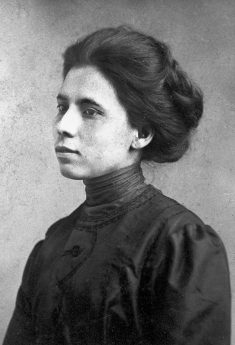| Jovita Idár Vivero | |
|---|---|
 |
|
| Career | Teacher, Political Activist, Journalist, Civil Rights Worker |
| Born | September 7, 1885 |
| Died | June 15, 1946 |
| Nationality | Mexican American |
Jovita Idár Vivero was a teacher, political activist, journalist, and civil rights worker. She fought for the cause of Mexican immigrants and Mexican-Americans.
Background
Jovita Idár was born on September 7, 1885 in Laredo, Texas to Jovita and Nicasio Idár. She married Bartolo Juarez, a plumber and a tinsmith, in May 1917. They lived in San Antonio until her death on June 15, 1946.
She was one of eight children. The Idárs were part of the gente decente, who had the opportunity to get a good education and better opportunities than most Mexico-Tejano families.
Her parents were advocates of the civil rights of Mexican-Americans. All of their eight children grew up in an environment where responsibilities, rights, and the underprivileged circumstances of every Chicano family were openly discussed.
In the book by Robin Kadison Berson entitled Marching to a Different Drummer, he wrote that while Jovita was growing up, she was a spirited girl, eager student, imaginative, and enjoyed reciting poetry before an audience. She even won prizes for her writings.
Teaching and Journalism
She earned her teaching certificate from the Holding Institute in Laredo in 1903. She was a teacher in Los Ojuelos, which was on the east of Laredo. Her first year as a teacher had an impact on her – there weren’t enough books, there weren’t enough paper or pens or pencils. If all her students attended class, there wouldn’t even be enough chairs or desks for everyone.
Having witnessed the Mexican Revolution (1910-1920), Idár turned her back from teaching and pursued journalism as a way of working towards creating an effective and meaningful change.
She went back to Laredo where she started to work with her brothers at La Crónica or The Chronicle, their father’s newspaper. Their paper became the major voice for Tejano and Mexican rights. She wrote articles under a pseudonym. She exposed the poor living conditions of Mexican American workers. She was a staunch supporter of the Revolution.
Starting in 1910, La Crónica featured news on current events, historical essays, and biographical essays that were related to Mexican Americans in Texas. They published testimonies on the status of the education system and social discrimination against Mexican Americans. Her stories were about poor economic conditions, loss of Mexican culture, the lynching of Hispanics, and the declining use of the Spanish language.
In 1911, their newspaper established a “fraternal order” called the Orden Caballeros de Honor to take up the troubling social issues during their time. She initiated the First Mexican Congress, the Premier Congreso Mexicano. They aimed to continue fighting against racism and inequality.
Volunteer Work & Legacy
Idár became the first president of La Liga Femenii Mexicanista or the League of Mexican Women. It was an “offshoot” of the Congress that was created in October 1911. Their main focus was to provide free education to Mexican children.
She was a volunteer too. She was active in both the First American Congress and the First Mexican Congress.
In 1921, she founded a free kindergarten school. She also volunteered in hospitals as an interpreter.
Jovita Idár’s contributions to society were overlooked for years, but just last year, September 2020, Google Doodle paid homage to Idár featuring her famous blockade of the offices of El Progreso against Texas rangers.